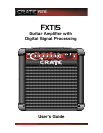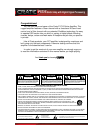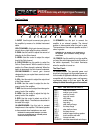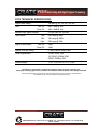
1 2 3 4 5 6 7 8 9 10
10
11
11
12
12
The Front Panel:
1: INPUT: Use this jack to connect your guitar to
the amplifier by means of a shielded instrument
cable.
SOLO CHANNEL: A high gain channel giving you
sounds from a slight edge to serious overdrive.
2: GAIN: Use this control to adjust the amount of
distortion for the Solo channel.
3: LEVEL: Use this control to adjust the output
level of the Solo channel.
4: SOLO/CLEAN: Use this switch to select the
Solo or Clean channel. With the switch in the out
position, the Clean channel is selected. When the
switch is depressed, the Solo channel is selected.
CLEAN CHANNEL: A normal gain channel
designed to give you crystal clear sounds to medi-
um distortion.
5: VOL: Use this control to adjust the output level
of the Clean channel.
6: LOW: Use this control to adjust the low fre-
quency level of the amplifier.
7: MID: Use this control to adjust the midrange fre-
quency level of the amplifier.
8: HIGH: Use this control to adjust the high fre-
quency level of the amplifier.
9. DSP: Use this control to select one of the 16
built-in digital effects. The effects are described in
the table to the right.
10: HEADPHONES: Use this jack to connect
headphones to the amplifier. The internal speaker
is disconnected when headphones are used.
CAUTION: To avoid possible damage to your hear-
ing, do not use headphones for extended periods
of time at extremely loud levels.
11: SPEAKER: Use this jack to connect the
amplifier to an external speaker. The internal
speaker is disconnected when this jack is used.
The impedance of the external speaker must be 4
ohms or greater.
WARNING: Do not attempt to use headphones in
the Speaker jack! Permanent hearing damage
could result!
12: POWER: Use this switch to turn the amplifier
on (top of the switch depressed) and off (bottom of
the switch depressed). The switch illuminates
when the amplifier is turned on.
The Rear Panel:
13: POWER CORD: The grounded power cord
should only be plugged into a grounded power out-
let that meets all applicable electrical codes and is
compatible with the voltage, power, and frequency
requirements stated on the rear panel. Do not
attempt to defeat the safety ground connection.
DSP: THE DIGITAL EFFECTS
REV 1 small room reverb
REV 2 medium room reverb
REV 3 small hall reverb
REV 4 large hall reverb
DLY 1 short delay
DLY 2 medium delay
DLY 3 long delay
FLNG 1 slow shallow flange
FLNG 2 fast deep flange
CHO 1 slow shallow chorus
CHO 2 fast deep chorus
RTRY medium-speed rotating speaker
T-WAH touch-sensitive wah-wah
I-WAH inverse wah-wah
DOUBLER simulates second track out-of-sync
F
XT15
Guitar Amp with Digital Signal Processing






